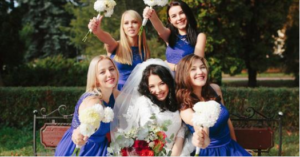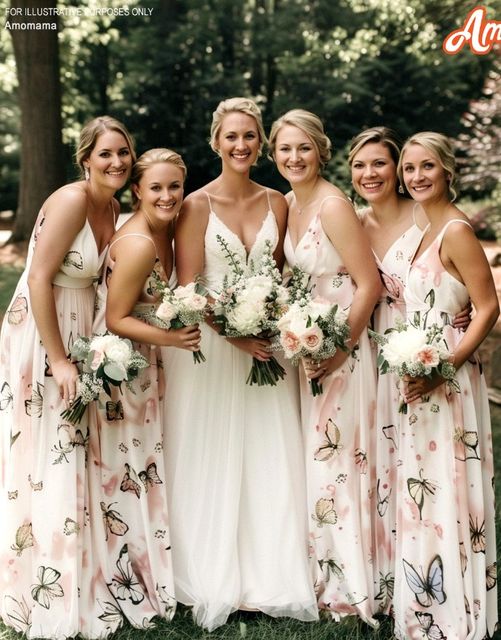
The bride immediately gets backlash when her bridesmaids refuse to pay for the dresses she bought for the ceremony.
It seems that no one can agree on whether the bride should bear the whole expense or if the bridesmaids should cover their own expenses. Adapting to the Assistance! “I’m a bit confused do the bridesmaids pay for their dresses or does the bride pay?” a lady asked in the I’m Getting Married Facebook group, where individuals getting ready for the big day can ask questions, get advise, and chat about wedding tips.
Many have noted that since the bride chose her bridesmaids for the wedding, she should be the one to pay.
“Bride and groom pay for everything for the wedding party,” someone commented.
In agreement, a second person stated, “My bridesmaids aren’t paying for anything.” They shouldn’t be expected to since I requested them to.
Simply put, a third said, “Definitely the bride.”
Some went above and beyond, pointing out that in addition to the cost of having their hair and cosmetics done, the bride should also cover the cost of their bridesmaids’ hotel accommodations for the night of the wedding.
“Paying for everything, hair makeup, dresses, and rooms; don’t want them to spend on unnecessary items; I have gift boxes with their jewelry and hair accessories inside for the morning,” one person remarked.
“I’m paying for my bridesmaids’ dresses, hair, makeup, bags, and jewelry, and the girls will get their own shoes,” stated another soon-to-be bride.
“I had three bridesmaids and I paid for everything,” a third person said. We were getting married in a hotel, so I paid for the hotel stay the night before the wedding along with the dresses, shoes, bags, jewelry, hair, and cosmetics.
Others emphasized that the bride and her bridesmaids make the final decision and that there are “no rules.”
“As long as everyone knows where they stand from the beginning, there are no rules,” one person stated. It all depends on your financial situation.
“We covered the cost of our bridesmaids’ gowns, hair, makeup, and overnight accommodations in addition to the jewelry gift.”
Groomsmen purchasing their own
One person noted that although the laws appear to vary by nation, in Ireland, the bride is typically responsible for covering the expense of the bridesmaids’ gowns.
“In Ireland, the bride pays here,” she remarked. I’ve paid for my dress, shoes, hair, makeup, and other expenses for five weddings in the United States. However, it doesn’t seem to be the case here.
Some objected, arguing that since brides already have to deal with high stress levels and demanding costs leading up to their wedding, bridesmaids should purchase their own gowns.
“My sister-in-law is having eight bridesmaids, and we are paying for our own dresses,” one person remarked.
Another person remarked, “My bridesmaids are shopping for their own dresses because I just told them the color and they show me when they find the one they love.”
“I don’t want three flower vases as bridesmaids,” she jokingly said.
A COMPLETION OF WEDDING VOWS
Meanwhile, after an inquisitive bride-to-be asked a personal question on their wedding night, newlyweds are all saying the same thing.
The unnamed bride enquired as to whether engaged couples intended to exchange vows that evening.
And many of the people who answered her question gave the exact same answer.
“Do any of you brides actually plan on consummating your wedding on your wedding night?” asked a woman on the same Facebook page.
I said,
“I plan on sleeping,” adding, “I have my sisters on the other side and my mother in the next room. I asked my husband to be with me, and he said, babe, you will probably wake up in (your) dress. We have been together for 19 years, and he never fails to shock me.”
Similar responses to the questions were received; one person wrote, “I plan on sleeping…
“We’ve discussed it and decided to do it the next morning if we don’t do it on our wedding night because it’s going to be a long day.”
“I told my fiancé if we don’t, we’re getting an annulment,” remarked another. But in all honesty, we’ll probably both end up unconscious.
Many said that because the day is so lengthy, sleeping is frequently the most enticing alternative. One person said, “We went to bed at five in the morning in our clothes, so no!”


